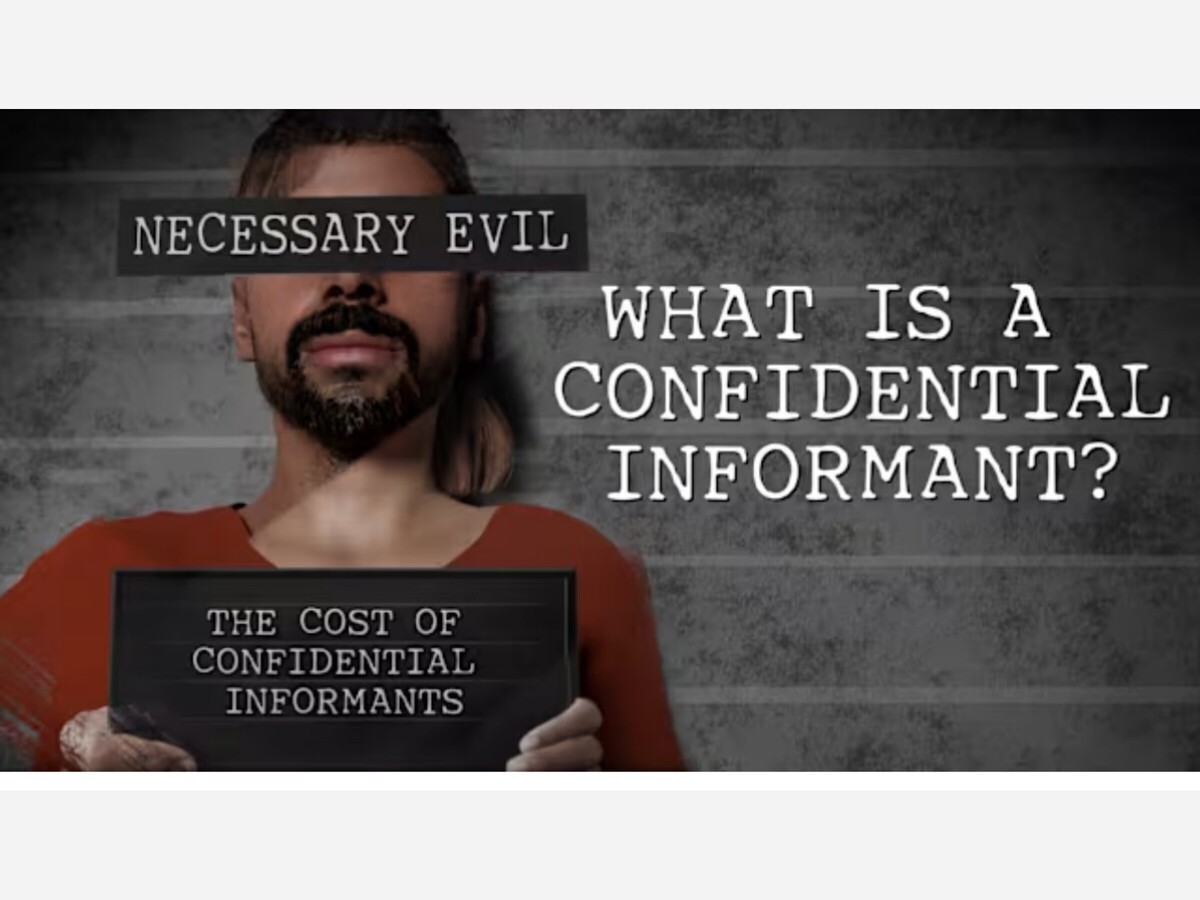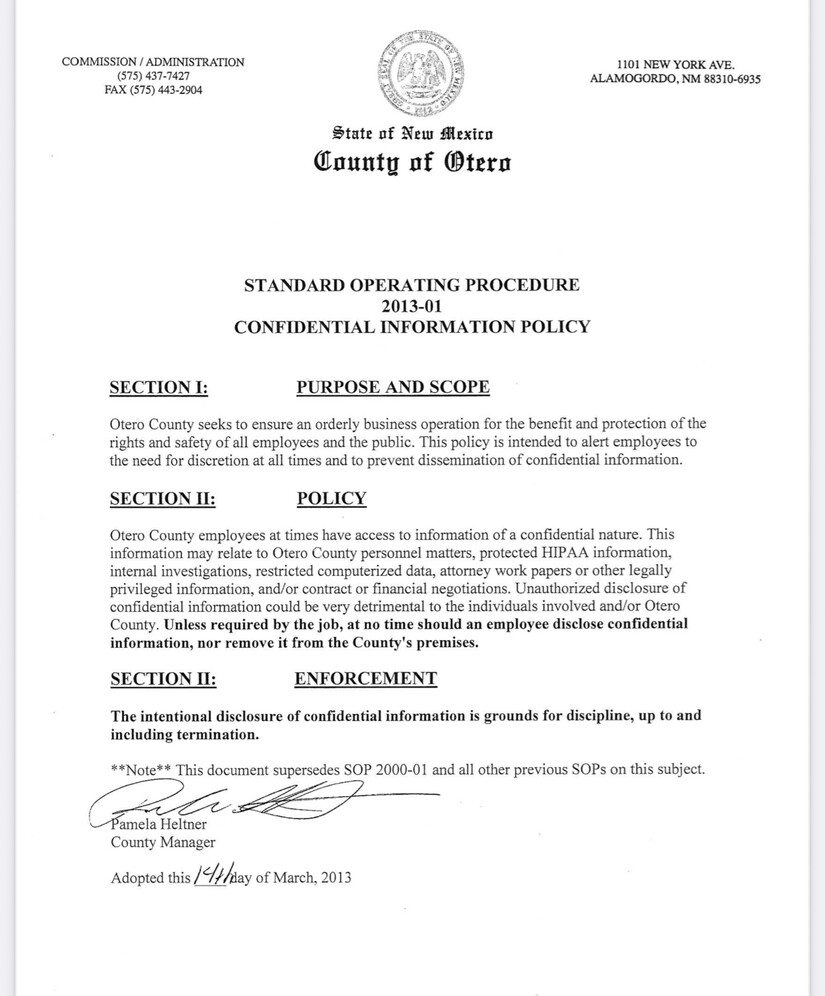Image


As a result of a recent Otero County Case decided by the State Supreme Court AlamogordoTownNews.org and NewMexicoConservativeNews.com asked a former Deputy of the Otero County Sheriff's Department, and an active member of the Alamogordo Police Department about local policing policies around confidential informants. Each explained the local use and policies but asked that their names be withheld siting a confidentiality memo that is required by the the county. The city has a similar policy as outlined below...

Otero County and the Alamogordo Police Department are heavily reliant on "Confidential Informants. Per policy Confidential informants are often uniquely situated to assist law enforcement in its most sensitive investigations. They may be involved in criminal activities or enterprises themselves, may be recruited by law enforcement because of their access and status, and, since they will not testify in court, usually can preserve their anonymity."
Informants have played major roles in the investigation and prosecution of a wide variety of crimes via all levels of law enforcement. The FBI has standards concerning confidential informant recruitment and those standards have been used to model polices at many state and local level organizations. "Locally confidential informants have been found to be particularly effective in cases involving the drug trade."
"Law enforcement agencies in Otero County, within the state and within Federal law enforcement develop qualified, live sources within the organized criminal element" or in Alamogordo and Otero Counties case, "within the drug trafficking and homeless community" per local law enforcement personnel who spoke to us on a condition of anonymity.
Per a former employee of the Otero County Sheriff's Department, "we have become deeply dependent upon confidential informants, to dependent in my mind, within the existing Sheriff's Department."
Over the years Directors of the FBI frequently have made reference to the value of informants snd encouraged local law enforcement to cultivate a resource network of local level informants all the while acknowledging that they present difficult challenges.
A former deputy suggested that many times "local informants are given too much leeway and believe being an informant provides them a level of local protection from law enforcement, thus they perpetuate crimes and are given a pass in order to catch a bigger fish."
There have been rumors that De Le O, the convicted murderer of Officer Ferguson, had been an informant and that is why he received leniency in earlier cases leading to an escalation. One officer speaking on a condition of confidentiality stated that "informants are a double edge sword and often abuse the system and their position.
Former FBI Director, William Webster concerning confidential informants once stated: " Not many people know very much about informants: and to many people, it's a queasy area. People are not comfortable with informants. There is a tradition against snitching in this country. However, the informant is THE with a capital "T" THE most effective tool in law enforcement today - state, local, or federal. We must accept that and deal with it.
Within the Otero County law enforcement community the jury is our on the excessive use of informants.
Some informants are responsible citizens who report suspected criminal activities without any hope of return. In the middle, other informants live in the midst of the criminal and most especially drug or crime elements and inform largely for cash. Still others, at the other pole, are charged with serious crimes and cooperate with law enforcement officials in return for the hope or promise of leniency.
Under that premise, a recent Otero County case that involved a career criminal, Michelle Perea went to the Supreme Court challenging the use of an informant in her case. She lost in a split 4-1 decision. Michelle Perea has a long history of criminal conduct from shoplifting convictions in Las Cruces to drug charges locally.
A confidential informant’s first-hand observations met the requirements needed for Alamogordo police to search a person’s home for evidence of selling drugs, the state’s highest court ruled last week.
In a split decision, all but one of the New Mexico Supreme Court’s justices on June 5 affirmed the state Court of Appeals’ reversal of a district court ruling that excluded drugs seized during the search.
The ruling stemmed from a 2019 search conducted by the Alamogordo Police Department of resident Michelle Perea’s home, based on information from a confidential informant.
The informant told police that in the preceding three days while inside Perea’s home, they had seen her handle large amounts of methamphetamine, and that she kept “a continuous supply of illicit narcotics” there and on her person.
Based on that information, provided in an affidavit, Magistrate Judge Steve Guthrie issued a search warrant for evidence of drug trafficking. When police searched the home, they found half a gram of what they suspected to be meth, along with paraphernalia. They arrested Perea and, while at the Otero County jail, found another 1.4 grams of what they suspected to be meth in her underwear.
Prosecutors then charged Perea with possession of meth and paraphernalia, but District Court Judge Angie Schneider granted her motion to suppress the evidence because the warrant lacked sufficient detail to support Guthrie’s probable cause finding.
Specifically, Schneider found the affidavit deficient because it did not provide any evidence Perea was selling drugs; failed to state how much meth the informant saw; how they knew that it was enough to be “consistent with trafficking;” how it was packaged; or how the informant observed her.
Perea’s trial for possessing meth has been on hold since state prosecutors appealed Schneider’s order suppressing the evidence to the Court of Appeals, saying in a notice to the court that the evidence is important to the prosecution.
The appeals court in March 2022 ruled that Guthrie had enough information from the police officer’s sworn statement to sign off on the warrant. The Supreme Court’s recent decision upholds the appeals court’s ruling.
While the justices refrained from creating hard-and-fast rules when it comes to probable cause, they wrote that the informant’s first-hand observations were enough to support the magistrate judge’s approval of the warrant in this case.
The use of confidential informants make some local law enforcement officers uncomfortable especially since the level of their use appears to be increasing. However this recent state Supreme Court case further suggests that the courts support the use.
Justice Michael Vigil dissented from the majority, writing that the affidavit was unconstitutional because it wasn’t specific enough to support a claim that Perea was trafficking meth, and instead only supporting the claim that she possessed it.
“To establish probable cause that methamphetamine is in a home does not by itself establish probable cause that trafficking is being conducted from that home,” Vigil wrote.
Vigil's disent is a cautionary tale as is the rumors around De La O. Our confidential sources suggest "the use of confidential sources is overused and excellent policing and investigative procedures negates the need, but that investigation takes work, effort and time."
As election season approaches in November and a new sheriff is selected questions should be raised worh the candidates on their thoughts around community policing and rules and boundaries around the use of confidential informants. As FBI Director Webster suggests its a needed resource but as local professionals suggest "there is a fine line to be wary of eith confidential informants and as a police professional we must always be aware of thst line and keep the larger public safety as the priority over a single case. "
See a NMSC case decided in early 2023 State v. Granado which is an OCSO NEU case mainly centering on seizure of persons, but clearly implicates CIs in that it discusses the two prongs of the test of CI tips one of which is did they have a reason to know what they claim. The other is reliability of the informant. In my recent encounter with police a CI is said to have identified a wanted individual in my car which, upon looking at the persons involved, could only be a case of mistaken identity if the informant was out of his mind on mind altering substances of some kind. But that is what you get when you hire folks that worked in the big city but now work for much less in the middle of nowhere.